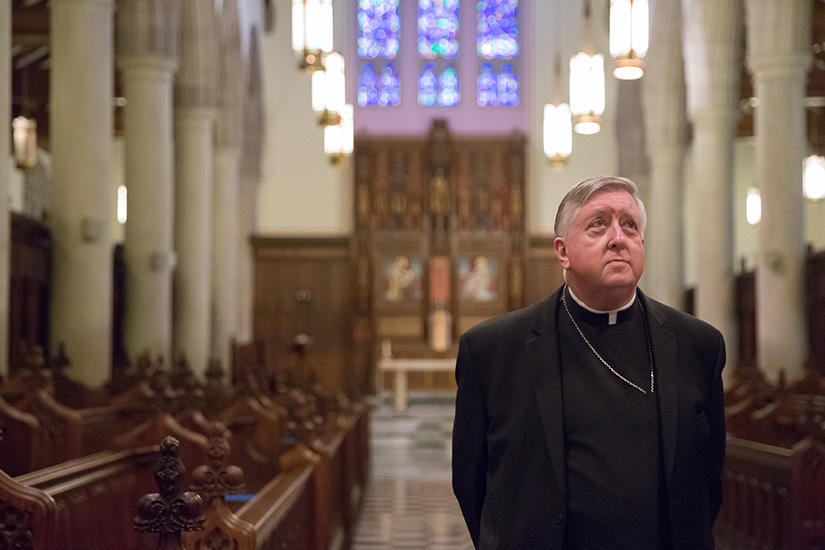Abp. Rozanski’s style: ‘caring, calming, reassuring’

Former flock full of praise for newly installed Archbishop of St. Louis
Archbishop Mitchell T. Rozanski spent the last six years leading the Diocese of Springfield, Mass., forming friendships and leading his flock.
Springfield Mayor Domenic J. Sarno issued a statement upon the appointment of Archbishop Rozanski to St. Louis, calling it “bitter sweet, Springfield and surrounding area’s loss and St. Louis’ gain. I’ve had a wonderful spiritual and working relation with Bishop Rozanski. He has always put forth a very caring, calming and reassuring leadership style. I will miss him and wish him congratulations and continued success in preaching the word of the Lord, peace, understanding and harmony.”
Springfield diocesan spokesperson Mark Dupont said Archbishop Rozanski displayed an episcopal style that’s inclusive, pastoral, Gospel-based.
In his farewell message to the people of his former diocese, Archbishop Rozanski said he enjoyed collaborating with people to bring the Gospel to others, including the wider community. He said he enjoyed visiting parishes and seeing the faith of the people alive and at work in varied ways, including prayer and reaching out to the wider community to meet needs. One of his last acts as Bishop of Springfield was to ordain five new priests on this the Feast of the Assumption of the Blessed Virgin Mother.
The diocese includes 79 parishes and seven missions with more than 199,289 Catholics. There are 130 diocesan priests and 54 priests from religious orders throughout the far western counties of Massachusetts (Berkshire, Franklin, Hampden and Hampshire). The St. Louis Archdiocese has 179 parishes and five missions with 505,243 Catholics and 314 diocesan priests and 260 religious priests serving the City of St. Louis and 10 counties in eastern Missouri.
Archbishop Rozanski’s new archdiocese is similar in size to the Archdiocese of Baltimore, his home diocese and where he served as an auxiliary bishop. The Archdiocese of Baltimore has 139 parishes and seven missions in nine counties and the City of Baltimore.
When Archbishop Rozanski was named to the Springfield Diocese, Baltimore’s diocesan paper, the Catholic Review, wrote of his self-deprecating sense of humor, his popularity among parishioners and fellow priests, approachability and down-to-earth, magnetic personality. He was seen as a “very good listener” with a pastor’s heart. As an auxiliary bishop, he was known for a blend of a pastoral approach and administrative talent. Bishop Rozanski also was praised for his work in Hispanic ministry, which he continued in his new diocese.
In a pastoral letter he wrote in 2016, “The Wideness of God’s Mercy” inspired by the Jubilee Year of Mercy called by Pope Francis, Archbishop Rozanski wrote that evangelization is “a daunting task, but one we must challenge ourselves to undertake. We must make our parish communities places where people want to worship, meet Jesus and form community. We must put the love of God foremost in all of our efforts. We must walk beyond our parish boundaries without fear, to demonstrate the faith we celebrate in liturgy takes form in the reality of the world around us.”
Diocese of Springfield

‘Change of heart’
In June, on the 57th anniversary of the murder of African American civil rights leader Medgar Evers, Archbishop Rozanski led a prayer service for racial healing in St. Michael’s Cathedral in his then-diocese, Springfield, Mas.
The prayer service was one of many events throughout the state and the nation that have followed the May 25 death of George Floyd, an African American man killed by a Minneapolis police officer who knelt on Floyd’s neck for nearly nine minutes.
“We realize it’s not changing of laws that help us address problems of racism in our nation and our world, but it is the change of heart,” he said, looking toward a crucifix of Jesus in the cathedral, saying that “we can’t look upon this crucifix and let our lives go on as they are.”
The bishop urged participants to take the cross of Jesus out into the communities to work on converting the hearts of others.
“If we truly believe what we read in the pages of Scripture, we cannot ignore the cross, its message and all its implications,” he said. “It is a sign, not of despair, but one of love and hope.”
In a statement July 3 regarding the Independence Day holiday, Archbishop Rozanski referred to the racial unrest following George Floyd’s death, he stated that “we have so much to be grateful to God in our lives as citizens of the United States. Thank God for those who almost 250 years ago, had the foresight in establishing this nation as a new frontier in freedom and self-governance. While we still are not perfect, we have been a beacon of light and hope for so many in our world over these two and a half centuries. Let us pray for the resolve that each citizen will live up to the lofty ideals set out by our forebearers and that the equality they envisioned may become a full reality in our land!”
Archbishop Rozanski joined the other bishops of Massachusetts, through the Massachusetts Catholic Conference, in issuing a statement urging passage of police reform legislation.
While acknowledging that “the vast majority of the police officers in the state of Massachusetts are capable and honorable public servants who serve and protect all residents with distinction,” the bishops also stated that racial biases affect the mindset of some police officers.
“The time has come for all of us to do our part to end racism and unite as one race,” the bishops wrote.
Some information for this story came from iObserve.org, Catholic Communications of the Diocese of Springfield.
Archbishop Mitchell T. Rozanski spent the last six years leading the Diocese of Springfield, Mass., forming friendships and leading his flock. Springfield Mayor Domenic J. Sarno issued a statement upon … Abp. Rozanski’s style: ‘caring, calming, reassuring’
Subscribe to Read All St. Louis Review Stories
All readers receive 5 stories to read free per month. After that, readers will need to be logged in.
If you are currently receive the St. Louis Review at your home or office, please send your name and address (and subscriber id if you know it) to subscriptions@stlouisreview.com to get your login information.
If you are not currently a subscriber to the St. Louis Review, please contact subscriptions@stlouisreview.com for information on how to subscribe.






